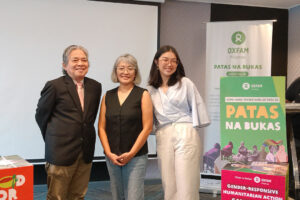Lost billions from flood control scandal could have funded health, education, says advocate

The billions of pesos that may have been lost to alleged graft-ridden flood control projects could have funded social services, including the health and education sectors, helping to address the country’s glaring inequality between the rich and the poor, according to Action for Economic Reforms (AER).
“The billions of pesos could have saved so many lives if they had gone to our public hospitals and to our PhilHealth (Philippine Health Insurance) benefits,” Sofia Beatriz “Pia” Rodrigo, advocacy and communications lead of AER, told BusinessWorld at the sidelines of its report launch in partnership with Oxfam Pilipinas on Tuesday.
“It could have saved so many young children from dying of malnutrition and funded their education,” she added.
The report titled “Inequality at a Breaking Point: A Call to Embed Equality in the Philippines’ Economic Agenda” found that the Philippines ranked 15th out of 63 countries in income inequality, based on the World Bank’s 2021 report.
It also noted that the country remained one of the most unequal in the Southeast Asian region.
The report also cited findings of the Philippine Statistics Authority (PSA), which showed that the richest 10% of the population earned more than double, or 115% more, than the poorest 40% in 2023.
“So for every peso earned by the poorest Filipinos, the richest earn around 150 pesos,” Mai Lagman, policy advocacy and communications manager of Oxfam Pilipinas, said during the event.
Among the key drivers of the country’s prevailing inequality are the lack of quality jobs—meaning permanent, skills-based jobs—as well as limited access to education and healthcare, Ms. Rodrigo said.
She pointed out that in terms of health, Filipinos’ out-of-pocket (OOP) expenses remain the third highest in the Southeast Asian (SEA) region at 45.5% as of 2021.
Filipino students are also lagging behind, with 76% to 84% scoring below the minimum proficiency level in science, reading, and math, Ms. Rodrigo said, citing the Programme for International Student Assessment (PISA) 2022 report.
To close the inequality, Filomeno Sta. Ana III, executive director of AER said that the pursuit of economic growth is not enough.
“While high growth has contributed to poverty reduction in East Asia, the Philippine experience highlights that growth alone is insufficient without equitable access to opportunities and strong redistributive policies,” Mr. Sta. Ana said.
The Action for Economic Reforms (AER) is also pushing for higher sin taxes on alcoholic beverages, cigarettes, and vapes to help generate additional funding for the health sector.
The group said the government may likewise explore the imposition of wealth taxes on the country’s top richest.
Ms. Rodrigo added that the Philippines must venture into new industries that harness emerging technologies such as artificial intelligence (AI), instead of relying solely on manufacturing.
Also, Oxfam and AER called for the full accountability of those involved in the alleged flood control project anomalies, saying the scheme has robbed the nation of public funds and opportunities. — Edg Adrian A. Eva



















